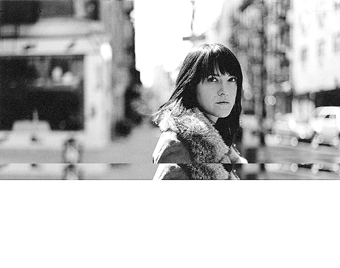Keren Ann’s “Nolita” celebrates the downtown sultriness of both her adopted hometowns
If anyone can put NoLita—the oft-disputed designation for the New York neighborhood nestled between Houston Street and the rapidly shrinking Little Italy—on the map, it is chanteuse Keren Ann Zeidel. In home studios in her New York and Paris apartments, Keren Ann, who prefers to be known by her first names, has put together one of this spring’s most celebrated releases.
In English and French, this child of a Russian-Israeli father and Dutch-Javanese mother lays down emotion as exposed and soothing as some of music’s greatest legends. Her sound has been compared to the music of Joni Mitchell and Nick Drake, and some of her twangier singles sound like a mix of the Cowboy Junkies and Velvet Underground.
Keren Ann’s blends her sensual, almost whispery voice with the sounds of cello, mandolin, harmonica, electric bass and fiddle—a minor hand injury has kept her from the acoustic guitar work so prevalent on her previous release, “Not Going Anywhere.” She writes all her songs, and although she claims these slow, sultry tunes are not about love, in a way they are odes to her love of Manhattan. The singer said that she was “raised like a sailor,” according to a March 20 New York Times profile, but with tracks like “Chelsea Burns” and the title number “Nolita,” she has clearly found a home port in Manhattan.
“In my case, home is wherever I’m at, so I kind of carry it with me,” Keren Ann said in a recent telephone interview. “I’m very attached to Paris because I have a base there and am also recording there, but New York is home to me when I’m in the U.S., because it’s nice to have a bed to go back to. If I look at it, it’s about being able to get lost in New York, to explore the city, to have more personal stories about New York, although some could also take place in Paris. I spend a lot of time writing in New York.”
“Chelsea Burns” and the final track, “Song of Alice,” featuring the actor and film director Sean Gullette, tell the story of a homeless woman rumored to have started a fire in the Chelsea Hotel. In “Roses & Hips” she paints a sidewalk scene of the city.
And the title track, “Nolita,” is clearly the best of the bunch. In this slow, haunting track about suffocation and loss, Keren Ann sings, “I think I’m gonna stay, I think I’m gonna bury you in myself/ I think it’s gonna rain, I think I’m gonna bury you in myself.” The song ends with Keren Ann’s breathy climax, both sexy and scary.
“It is about someone from the past coming and looking for a safe place,” said Keren Ann. “I was in the studio so much, it was about the search for air in a metaphoric sense, and the breathing has more to do with travel for me, about the search musically for open air.”
Because she works in home studios here and in Paris, Karen Ann often loses track of time, not knowing if it is four o’clock in the morning or afternoon.
Four of her tracks are sung in French. Keren Ann gave a loose translation. She explained that “Que N’ai-je?” describes a time when one wants to disappear from the past, to “burn all evidence of being here.” In “La Forme et le Fond,” translated as the outside and the inside, Keren Ann said the narrator remembers a time when she was innocent, even though that time has passed.
“In the chorus she says she flirts with the wind, just makes noise and breaks stuff,” said Keren Ann. “The best way to describe it is Lola from that old Barry Manilow song, ‘Copacabana.’ She was a showgirl, young and beautiful, and then something happened and she became crazy, lost her mind.”
“Midi dans le salon de la Duchesse,” translates to “Noon at the living room of the Duchess,” and is about a young girl who has teatime with an older artist that she calls the Duchess. “The Duchess asks, ‘What you have done with your youth?’” Keren Ann explained, “and the girl says, ‘My youth belongs to those who are still in love.’”
“L’onde amère” is about getting lost in time and thinking that’s alright, but coming to realize that when you are at sea, you are always at risk, “because when you no longer have something to lose, it means you don’t love.” The cosmopolitan feel of these tracks is balanced by the seriously twangy, Cowboy Junkie sound in “Chelsea Burns,” “One Day Without” and “Roses & Hips.”
Her rich vocal stylings seem at odds with her simple lyrics, but Keren Ann’s sylph-like voice somehow give them a much deeper meaning. At 30 years old, Keren Ann is already well on her way to success, and living the life of a seasoned rocker, beating the streets of her NoLita neighborhood, chain-smoking and staying up late recording songs and watching old movies.
Her favorite? The 1940 flick, “The Shop Around the Corner” with Jimmy Stewart and Margaret Sullavan, a story of missed connections and eventual love between a shop girl and a clerk. The story of pain and love in the big city—the perfect fodder for her songs.
gaycitynews.com

































